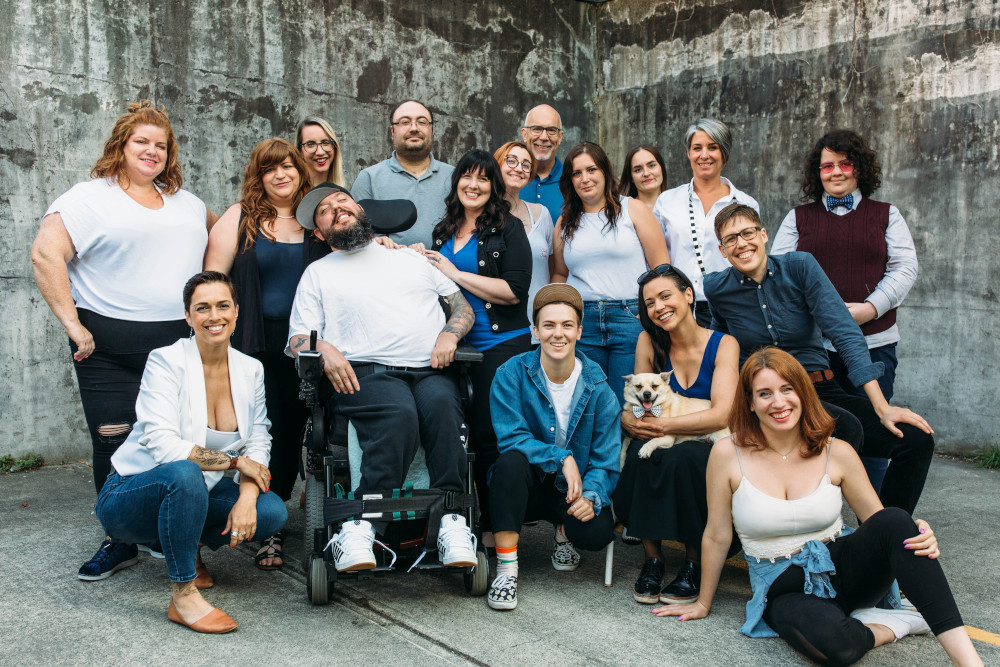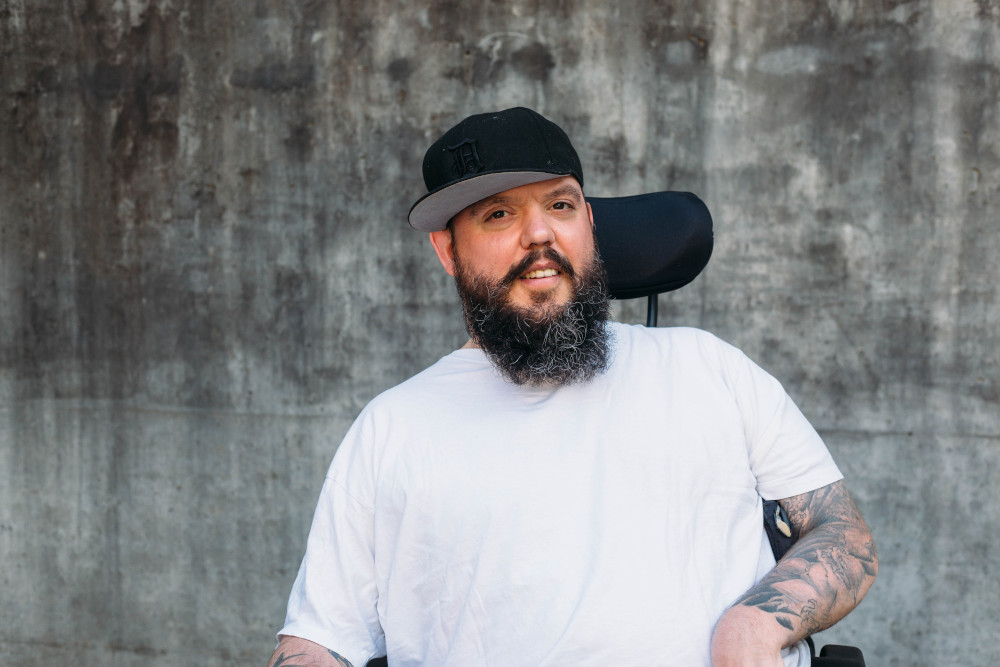When comedians have a good stand up set, they kill, and a bad set means they die. Comedian Ryan Lachance takes this attitude to the next level.
He’s been known to bust out of the hospital to perform a show, and then check himself back in, telling jokes to the nurses all the while.
Lachance has quad spastic cerebral palsy, which limits his use of all four limbs. His health care requires time, energy and money.
But he’s also a survivor in other ways. When he was a teenager, Lachance was abused by a care aide who was “way too dedicated to his job,” he jokes.
This kind of assault is not uncommon. People with disabilities are almost twice as likely to be victimized in their own homes as those without a disability.
Lachance is the co-headliner of a new comedy show by survivors of sexual assault called Rape is Real & Everywhere that attempts to reveal the truth of survivors’ experiences. (Full discloser: I am the producer of the show.)
I recently had the opportunity to pick Lachances’s hilarious brain, and talk about why making jokes about difficult subjects is important to him. The interview has been lightly edited for clarity and length.
The Tyee: What motivated you to talk about your own assault?
Ryan Lachance: It happened to me when I was 15 years old and I am now 40, and I wanted to move on. I wanted to feel that it was OK and that I could find some forgiveness for myself. I felt really weird sexually, and sex didn’t make sense to me because of what had happened. I wanted to feel like a normal human being.
I have always used humour to help me deal with pain and with life in general. As a person who has been raped and molested, jokes were a coping mechanism. I always find a way to make the hard stuff funny.
A lot of abuse is unspoken, and people don’t know what goes on in the disabled community. There aren’t as many voices that can say what is going on. This shit happened to me, it’s OK to speak up about it, to say something about what happened.
In the disability community, social workers write up reports, and everyone kind of forgets about the abuse. It’s bullshit. People should be held accountable for what they do.
There are instances of disabled people being victimized by able-bodied people, but disabled people can hurt each other too. No one even seems to think that that is possible.
This show is the most challenging thing I have ever done in my life. It made me look at issues that I had compartmentalized and put away for a long time. The upside is that it’s forcing me to realize it’s OK, and I’m working with such wonderful people. The comedians and audience members that choose to be there make this an amazing experience. I’m so glad to be part of it. I wouldn’t change it for the world. I mean, I’m not glad it happened, but this is the best way to move forward for me.
Ideally, we can help create an open discussion where more people, especially in the disabled community, can speak about their experiences.

How are you preparing for the show?
I’m trusting in my ability to take something traumatic and turn into something funny. My whole career I have not been able to write stuff down, so I force myself to think about it, to process it and try to transform it into something funny in my head. I’m relying on that process and my experience to get through. I also have people in the comedy community to bounce ideas off of so that I’m not all over the place.
How would you describe Rape is Real?
I describe it as facing the monsters under the bed and saying “You are not in charge of me anymore.” I think it’s a communal experience for both audience and performers to process some of the evil shit that happens. We have to remember that this affects everyone, even if they have not themselves lived through it. There is that overall energy and emotion in the air. It’s not a traditional comedy show with a punchline every six seconds; it’s a way for people to pull their faces out of their phones, to feel raw emotion and shock people into feeling human together. Plus, it’s cheaper than therapy. (Laughs.)
What else needs to be added in the discussion about sexual assault to include folks with disabilities?
There are a lot of organizations that deal with specific disabilities. There are also groups who help with moving forward in life, getting work, finding housing, and social group outings. These places can’t always discuss the bad stuff. In all of my experience interacting with services, people want to remain happy-go-lucky. Sometimes I wish there was a chance for people with disabilities to say, “This fucking sucks and it’s hard and it needs to change.”
I respect people who can remain upbeat, but it’s also healthy to realize that we are going through shitty things as well. Coping with chronic pain alone is something that many folks with disability deal with. Many able-bodied people wouldn’t be able to get out of bed if they had to deal with the amount of pain I deal with as a regular part of my day. I have issues with the basic stuff; on top of that I was abused for a year-and-a-half by someone who was supposed to take care of me. Honestly, I’m surprised I’m still here talking to you.
So sometimes dealing with the stuff of life, emotions and sexual health, falls between the cracks?
In my experience, if it doesn’t fit into the major boxes, it doesn’t happen. Information about sexual health, in general, is limited for folks with disabilities. It’s a taboo subject. People don’t want to talk about it with you because they think they will hurt your feelings. It’s crazy. It’s not common knowledge, and it should be. It should be in the forefront. I went to sex ed like everyone else in school. I would bring up questions and would get patronizing answers.
I don’t identify my chair as being part of me; it’s just the way I get around. Other people need to see that, so that there is real access to information.
What is it about comedy that is helping or healing?
With laughter in general, you feel better, you release endorphins. Laughter is healthy. That’s why the arts are so important to the human race. We need music, art and stand-up comedy to keep going. When you are around it, you are just a better person. Although, there are some shitty open mics in the world. (Laughs.)
Is there anything else you want to add?
Come to the show whether you’re affected by sexual assault or not. It’s an important thing, to feel emotion. I don’t want to be one of those people who die inside because of what happened to me. I love who I am, and I want to keep loving myself. That’s why I’m doing the show.
Ryan Lachance co-headlines Rape is Real & Everywhere, debuting at the Vancouver Fringe Festival this Friday at 5 p.m. For tickets and further details, click here.
Read more: Rights + Justice, Media
















Tyee Commenting Guidelines
Comments that violate guidelines risk being deleted, and violations may result in a temporary or permanent user ban. Maintain the spirit of good conversation to stay in the discussion.
*Please note The Tyee is not a forum for spreading misinformation about COVID-19, denying its existence or minimizing its risk to public health.
Do:
Do not: